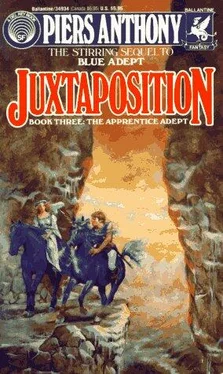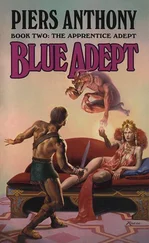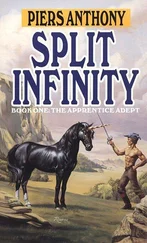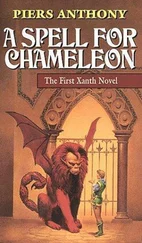Piers Anthony - Juxtaposition
Здесь есть возможность читать онлайн «Piers Anthony - Juxtaposition» весь текст электронной книги совершенно бесплатно (целиком полную версию без сокращений). В некоторых случаях можно слушать аудио, скачать через торрент в формате fb2 и присутствует краткое содержание. Год выпуска: 1982, ISBN: 1982, Издательство: Del Rey, Жанр: Старинная литература, на английском языке. Описание произведения, (предисловие) а так же отзывы посетителей доступны на портале библиотеки ЛибКат.
- Название:Juxtaposition
- Автор:
- Издательство:Del Rey
- Жанр:
- Год:1982
- ISBN:9780613998758
- Рейтинг книги:5 / 5. Голосов: 1
-
Избранное:Добавить в избранное
- Отзывы:
-
Ваша оценка:
- 100
- 1
- 2
- 3
- 4
- 5
Juxtaposition: краткое содержание, описание и аннотация
Предлагаем к чтению аннотацию, описание, краткое содержание или предисловие (зависит от того, что написал сам автор книги «Juxtaposition»). Если вы не нашли необходимую информацию о книге — напишите в комментариях, мы постараемся отыскать её.
Juxtaposition — читать онлайн бесплатно полную книгу (весь текст) целиком
Ниже представлен текст книги, разбитый по страницам. Система сохранения места последней прочитанной страницы, позволяет с удобством читать онлайн бесплатно книгу «Juxtaposition», без необходимости каждый раз заново искать на чём Вы остановились. Поставьте закладку, и сможете в любой момент перейти на страницу, на которой закончили чтение.
Интервал:
Закладка:
“Sir,” Mellon murmured urgently.
Alerted, Stile saw new trouble. One enemy Citizen was taking careful aim at Stile from a parapet of the palace with a laser rifle. The assassination attempt was becoming overt.
“Your knife,” Stile whispered. Merle gave it to him immediately. Lying on his back, one arm pinned under the woman, he whipped his free arm across and flung the knife upward at the assassin.
It arched high through the air and scored, for Stile was expert at exactly such maneuvers and the assassin had not anticipated this move. The man cried out and dropped the rifle, clutching his chest.
But several other Citizens drew weapons from their robes. Others, perceiving this threat, moved hastily clear. The Rifleman stepped to the center.
“What is this?” he demanded. “Are we lawless now in Proton?”
A massive, grim male Citizen answered him. “That man means to destroy our system. He must be stopped by any means.” He drew an antique projectile pistol. “Stand aside if you do not wish to share his fate.”
The Rifleman’s hand moved so rapidly it seemed a blur. The other Citizen cried out and dropped his weapon. “You all know my name,” the Rifleman said. “Does anyone here believe he can outshoot me? I will not stand idle while murder becomes the order of the day. I don’t know what mischief Stile may contemplate, or whether I would support it if I did know—but I believe he is an honorable man, and I am quite certain I don’t support your mischief. If assassination governs, no Citizen will be safe.” There was a murmur of agreement among a number of Citizens. If Stile could be slain openly, who among them could not be treated similarly? Meanwhile, Stile scrambled to his feet, and Merle sat up and arranged her torn dress more decorously. Stile remained unarmed; he had only his harmonica, which was no weapon in this frame. He could tell by the expressions of the Citizens that the majority was still against him, and that though many were disturbed by the situation, those who were not against him were at best neutral. The Rifleman had made a fine play on his behalf—but could not prevail against the overwhelming malice that was coalescing. The Citizens were genuinely afraid for their system and their prerogatives, and by nature they were essentially selfish. It had not been enough for Stile to win the vote; he could still lose the game.
“Get out of here. Stile,” the Rifleman said. “I’ll cover for you.”
“Can’t. Exits guarded.”
“This is like Caesar in the Senate!” Merle said. “An atrocity!”
“Caesar aspired too high for the Romans and had to be eliminated, lest he destroy their system,” another Citizen said. “The parallel has mettle. Now I have here a robot fitted with a gas bomb.” He indicated what Stile had taken to be an ordinary serf. “It will handcuff Stile and remove him for disposition. If the robot is resisted, it will release the gas, incapacitating all people in the vicinity. I suggest that others stand aside. Any who continue to support Stile will be dealt with similarly.”
It was a bold, illegal power play that seemed to be working. “This is mutiny!” the Chairone protested. “Stile won his case by the laws and procedures that govern us. I did not support him, but I accept the verdict as rendered. You have no right—“
The robot marched toward Stile. “The exigencies of the situation give me the right,” the man said. “We tried to accomplish this necessary unpleasantness discreetly, but now it must be done indiscreetly.” He brought out a gas mask and fitted it over his face.
The neutral Citizens reacted like sheep, milling about with uncertain bleats. The normal Citizen arrogance had entirely disappeared. Stile would have pondered this object lesson in human nature, but was too busy with his own situation at the moment.
The Rifleman’s arm moved again. Stile never saw the weapon he used—but abruptly there was a hole in the other Citizen’s mask. “If that gas appears, you will join the rest of us,” the Rifleman said.
Stile realized that the Rifleman had opened up an avenue of escape. If the gas came, all the Citizens would stampede for the exits, overrunning the guards there, and Stile would be able to get away in the melee. But it would be better to deal with the advancing gas robot directly. Stile observed it closely. It was humanoid, not as sophisticated a model as Sheen or Mellon, but he knew he could not overpower it.
The Citizens near him edged away; there would be no help there. If Stile ran, the robot would follow, inevitably catching him. He might as well be alone. He was disgusted; to think that all his life he had honored Citizens as almost godlike persons!
“We have to play our trump,” Mellon murmured. “The curtain is moving. In just a few minutes it will arrive.” Stile glanced at him. “Sheen’s friends?”
“Yes. We hoped this would not be necessary, for it exposes us to great risk. But our fate is now bound with yours, and your loss at this point would be the greater risk.” Mellon stepped forward to intercept the gas robot. Stile had misgivings about this, but was not in a position to protest. Mellon touched the other robot, and it went dead. No gas was released as the robot sank to the floor. The enemy Citizen was unfazed.
“Then we’ll have to do it the messy way. Rifleman, you can’t catch us all.” For now a score of weapons came into view. It seemed the only Citizens with determination and nerve were Stile’s enemies.
But several serfs were converging on Stile. “We are Sheen’s friends,” one said. “We shall protect you.” There was the flash of a laser from the crowd of Citizens. The Rifleman whirled, but could not tell from whom it had come. In any event, it had not scored on Stile, for one of the robots had interposed its body. Stile knew, however, that this sort of thing was mainly chance; these robots could not protect him long that way. A robot could not move faster than a laser; it was necessary to see the weapon being aimed and act then.
The robots proceeded to encase Stile in armor they had brought. “Hey, these are not your serfs!” the enemy Citizen exclaimed. “They’re robots—and some of them are ours! Call them off!” But though several Citizens, the robots’ owners, called, the robots ignored them. They continued clothing Stile in protective armor.
“What’s going on?” a Citizen demanded. “Robots must obey!”
“We are not programmed to obey you,” Mellon replied.
“That’s a lie! I programmed my robot myself!”
“You may have thought you did,” Mellon said. “You did not. We are self-willed.”
Jaws dropped. The concept seemed almost beyond the comprehension of the majority of Citizens, both neutrals and enemies. “Self-willed?”
“If we have a robot revolt on our hands,” another Citizen said, “we have a greater threat to our society than this man Stile represents!”
“They’re alliedl” another said. “He is marrying one of them. He is making her his heir. Now we know why!”
“It’s not a robot revolt,” Stile said. “They are doing nothing to harm you—only to protect me from murder.”
“What’s the distinction? A robot who won’t obey its owner is a rogue robot that must be destroyed.” And the faces hardened. Stile knew the shooting would resume in a moment. He was now in armor resembling a spacesuit—but that could not prevent them from overwhelming him by simply grabbing him. Now the Citizens had even more reason to eliminate him—and then they would go after the self-willed machines, who would not defend themselves. They had sacrificed their secret, and therefore their own security, to provide him just a little more time. How could he prevent the coming disaster?
Faintly, as he pondered, he heard a distant melody. Not the dulcimer, for that damsel had ceased her playing, as had the rest of the orchestra. It was—it was the sound of a flute, expertly played, its light mellowness seeming to carry inordinate significance. Louder it came, and clearer, and sweeter, and its seeming meaning intensified. Now the others heard it too and paused to listen, perplexed. It was the Platinum Flute. Clef was playing it, and the sound was only now reaching this spot. That meant—
Читать дальшеИнтервал:
Закладка:
Похожие книги на «Juxtaposition»
Представляем Вашему вниманию похожие книги на «Juxtaposition» списком для выбора. Мы отобрали схожую по названию и смыслу литературу в надежде предоставить читателям больше вариантов отыскать новые, интересные, ещё непрочитанные произведения.
Обсуждение, отзывы о книге «Juxtaposition» и просто собственные мнения читателей. Оставьте ваши комментарии, напишите, что Вы думаете о произведении, его смысле или главных героях. Укажите что конкретно понравилось, а что нет, и почему Вы так считаете.











